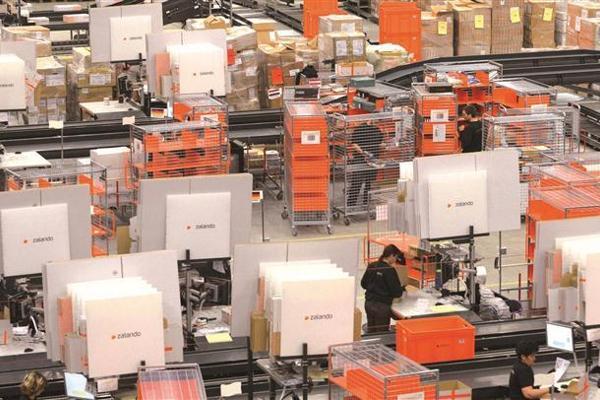Eurozone business expands for first time in 18 months
LONDON - Reuters


This file photo shows employees of the internet retail company Zalando in Germany. The eurozone PMI rose to 50.5 in July from 48.7 in June. AFP photo
Eurozone business expanded for the first time in 18 months in July, albeit very slightly, according to a survey released yesterday that suggested the economy is slowly starting to stabilize.Markit’s Eurozone Composite Purchasing Managers Index (PMI) rose to 50.5 last month from 48.7 in June, breaking above the 50 threshold indicating growth for the first time since January 2012. The headline figure was revised up a tick from a preliminary reading of 50.4.
The survey gauges how thousands of euro zone companies fare every month. Although new orders fell again in July, the rate of decline was the weakest since August 2011.
Overall, the survey suggested the economy is starting to exit recession - even if healthy growth still looks like a distant prospect.
“Granted, the euro area has experienced false dawns before, but the improvements in confidence and other forward-looking indicators warrant at least some optimism for the outlook this time around,” said Rob Dobson, senior economist at PMI compiler Markit.
“The real sparks which will hopefully ignite the recovery are the increasing signs of stabilization in domestic markets. This not only aided manufacturers, but also pulled the service sector right back to the cusp of recovery.”
Germany rebounds
German business activity rebounded in July, while the downturns in the euro zone’s next three biggest economies - France, Italy and Spain - eased.
The region-wide survey’s jobs index rose to 48.6 last month from 47.4, signaling a slowing pace of job cuts.
The euro zone unemployment rate eased to 12.1 percent in June from May’s 12.2 percent, although more than 19 million citizens are still out of work, with joblessness endemic in Greece and Spain.
Germany’s PMI rose to 52.1 in July from 50.4 the previous month. “Germany’s economy has started the third quarter on a positive footing,” said Tim Moore, senior economist at Markit.
France’s PMI rose to 49.1, up from June’s 47.4 and from a preliminary reading of 48.8 for July. France’s private sector shrank at its slowest pace in 17 months last month. “The French service sector made a further move towards stabilization in July, with activity and new business both showing slower falls,” said Markit economist Jack Kennedy.
Italy’s services sector shrank in July at its slowest pace since going into a downturn in the summer of 2011. Its PMI jumped to 48.7 in July from 45.8 in June. Markit economist Phil Smith said the data showed a bright start to the third quarter, but that job cuts and weak demand in the sector meant continued improvement was not certain.
Spain’s services sector contracted at the slowest rate since June 2011 in July, as the industry’s decline eased for the third straight month. The PMI index of service companies stood at 48.5 in July, up from 47.8 in June, and marking the 25th month the index was below the 50 line separating growth from contraction. “The Spanish service sector came close to a change of momentum in July, with the rate of contraction in activity easing further during the month. Should this current trend be built upon, we could be in line to see a return to growth of GDP by the end of the year,” economist at Markit Andrew Harker said.
“The labor market remains the main bugbear of the eurozone, as rising joblessness hurts growth and raises political and social tensions. But even here there was some better news, with the rate of job cutting easing to a 16-month low,” said Dobson.
The services PMI, which covers firms ranging from banks to hotels, rose to 49.8 from 48.3 in June.
Optimism about the coming year rose to its highest since March last year, as the PMI backed a series of more upbeat sentiment indicators over the last week, among both investors and consumers.
Euro zone consumer morale hit its highest level in almost two years in July, just as economic sentiment hit a 15-month high.
